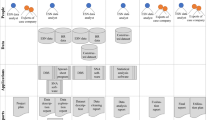Abstract
The paper provides the overview of essential analyses and methods, helpful for enterprise architecture improvement and based on social network approach. The ideas presented in this paper focus on social network, that is built with the use of real-life manufacturing company data. It has been shown that corporate social network analysis, as a decision support system, may be influential for managing a company. Several ideas, measurements, interpretations and evaluation methods are given and discussed, in particular centrality degree, social network extraction, process management.
Access this chapter
Tax calculation will be finalised at checkout
Purchases are for personal use only
Preview
Unable to display preview. Download preview PDF.
Similar content being viewed by others
References
van der Aalst, W.M.P., Song, M.S.: Mining Social Networks: Uncovering Interaction Patterns in Business Processes. In: Desel, J., Pernici, B., Weske, M. (eds.) BPM 2004. LNCS, vol. 3080, pp. 244–260. Springer-Verlag, Berlin (2004)
Bernard, H.R., Killworth, P., Sailer, L.: Summary of research on informant accuracy in network data and the reverse small world problem. Connections 4(2), 11–25 (1981)
Bernard, H.R., Killworth, P., Kronenfeld, D., Sailer, L.: The problem of informant accuracy: the validity of retrospective data. Annual Review of Anthropology 13, 495–517 (1984)
Bird, C., Gourley, A., Devanbu, P., Gertz, M., Swaminathan, A.: Mining email social networks. In: Proceedings of the 2006 International Workshop on Mining Software Repositories (MSR 2006), pp. 137–143. ACM, New York (2006)
Boyd, D.M., Ellison, N.B.: Social network sites: Definition, history, and scholarship. Journal of Computer-Mediated Communication 13(1), article 11 (2007)
Daft, R.L.: Organization Theory and Design, 10th edn. Cengage Learning
Freeman, L.C.: Centrality in social networks conceptual clarification. Social Networks 1(3), 215–239 (1978-1979)
Haythornthwaite, C., Wellman, B., Mantei, M.: Work relationships and media use: A social network analysis. Group Decision and Negotiation 4(3), 193–211 (1995)
Iseminger, D.: Active Directory Service for Microsoft Windows 2000 Technical Reference. Microsoft Press, Redmond (2000)
Kazienko, P., Bródka, P., Musiał, K., Gaworecki, J.: Multi-layered Social Network Creation Based on Bibliographic Data. In: The Second IEEE International Conference on Social Computing, SIN 2010, Symposium on Social Intelligence and Networking, SocialCom 2010, pp. 407–412. IEEE Computer Society Press, Los Alamitos (2010)
Kazienko, P., Musiał, K., Zgrzywa, A.: Evaluation of Node Position Based on Email Communication. Control and Cybernetics 38(1), 67–86 (2009)
Krebs, V.: The Social Life of Routers. Internet Protocol Journal 3, 14–25 (2000)
Musiał, K., Bródka, P., Kazienko, P., Gaworecki, J.: Extraction of Multi-layered Social Networks from Activity Data. Journal of Global Information Management (2011) (in press)
Musiał, K., Kazienko, P.: Social Networks on the Internet. In: World Wide Web (2011)
Musiał, K., Kazienko, P., Bródka, P.: User Position Measures in Social Networks. In: The Third SNA-KDD Workshop on Social Network Mining and Analysis. ACM Press, Paris (2009), Article no. 6
Onnela, J.-P., Saramaki, J., et al.: Structure and tie strengths in mobile communication networks. Proceedings of the National Academy of Sciences, 7332–7336 (2007)
Palus, S., Bródka, P., Kazienko, P.: Evaluation of Organization Structure based on Email Interactions. International Journal of Knowledge Society Research 2(1) (2011)
Resig, J., Santosh Dawara, C.M.H., Teredesai, A.: Extracting social networks from instant messaging populations. In: Proceedings of the ACM SIGKDD International Conference on Knowledge Discovery and Data Mining (KDD) Workshop on Link Analysis and Group Detection (2004)
Traud, A.L., Kelsic, E.D., Mucha, P.J., Porter, M.A.: Community structure in online collegiate social networks. American Physical Society, APS March Meeting, abstract #H9.013 (2009)
Wagle, D.: The case for ERP systems. The McKinsey Quarterly 2, 131–138 (1998)
Zack, M.H.: Researching organizational systems using social network analysis. In: Proceedings of the 33rd Annual Hawaii International Conference on System Science (2000)
Author information
Authors and Affiliations
Editor information
Editors and Affiliations
Rights and permissions
Copyright information
© 2011 Springer-Verlag Berlin Heidelberg
About this paper
Cite this paper
Kazienko, P., Michalski, R., Palus, S. (2011). Social Network Analysis as a Tool for Improving Enterprise Architecture. In: O’Shea, J., Nguyen, N.T., Crockett, K., Howlett, R.J., Jain, L.C. (eds) Agent and Multi-Agent Systems: Technologies and Applications. KES-AMSTA 2011. Lecture Notes in Computer Science(), vol 6682. Springer, Berlin, Heidelberg. https://doi.org/10.1007/978-3-642-22000-5_67
Download citation
DOI: https://doi.org/10.1007/978-3-642-22000-5_67
Publisher Name: Springer, Berlin, Heidelberg
Print ISBN: 978-3-642-21999-3
Online ISBN: 978-3-642-22000-5
eBook Packages: Computer ScienceComputer Science (R0)




